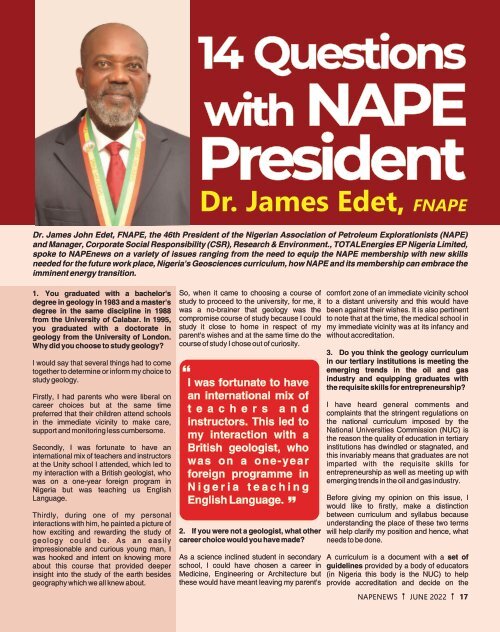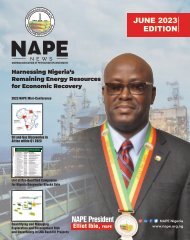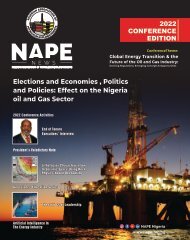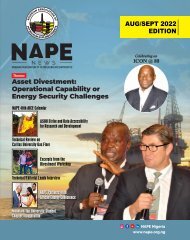NAPENews Magazine June 2022 Edition
June 2022 Edition of the NAPE News Magazine is the Mid-Year Edition. Happy reading.
June 2022 Edition of the NAPE News Magazine is the Mid-Year Edition. Happy reading.
You also want an ePaper? Increase the reach of your titles
YUMPU automatically turns print PDFs into web optimized ePapers that Google loves.
14 Questions<br />
with NAPE<br />
President<br />
Dr. James Edet, FNAPE<br />
Dr. James John Edet, FNAPE, the 46th President of the Nigerian Association of Petroleum Explorationists (NAPE)<br />
and Manager, Corporate Social Responsibility (CSR), Research & Environment., TOTALEnergies EP Nigeria Limited,<br />
spoke to NAPEnews on a variety of issues ranging from the need to equip the NAPE membership with new skills<br />
needed for the future work place, Nigeria's Geosciences curriculum, how NAPE and its membership can embrace the<br />
imminent energy transition.<br />
1. You graduated with a bachelor's<br />
degree in geology in 1983 and a master's<br />
degree in the same discipline in 1988<br />
from the University of Calabar. In 1995,<br />
you graduated with a doctorate in<br />
geology from the University of London.<br />
Why did you choose to study geology?<br />
I would say that several things had to come<br />
together to determine or inform my choice to<br />
study geology.<br />
Firstly, I had parents who were liberal on<br />
career choices but at the same time<br />
preferred that their children attend schools<br />
in the immediate vicinity to make care,<br />
support and monitoring less cumbersome.<br />
Secondly, I was fortunate to have an<br />
international mix of teachers and instructors<br />
at the Unity school I attended, which led to<br />
my interaction with a British geologist, who<br />
was on a one-year foreign program in<br />
Nigeria but was teaching us English<br />
Language.<br />
Thirdly, during one of my personal<br />
interactions with him, he painted a picture of<br />
how exciting and rewarding the study of<br />
geology could be. As an easily<br />
impressionable and curious young man, I<br />
was hooked and intent on knowing more<br />
about this course that provided deeper<br />
insight into the study of the earth besides<br />
geography which we all knew about.<br />
So, when it came to choosing a course of<br />
study to proceed to the university, for me, it<br />
was a no-brainer that geology was the<br />
compromise course of study because I could<br />
study it close to home in respect of my<br />
parent's wishes and at the same time do the<br />
course of study I chose out of curiosity.<br />
“<br />
I was fortunate to have<br />
an international mix of<br />
t e a c h e r s a n d<br />
instructors. This led to<br />
my interaction with a<br />
British geologist, who<br />
was on a one-year<br />
foreign programme in<br />
N i g e r i a t e a c h i n g<br />
English Language.<br />
”<br />
2. If you were not a geologist, what other<br />
career choice would you have made?<br />
As a science inclined student in secondary<br />
school, I could have chosen a career in<br />
Medicine, Engineering or Architecture but<br />
these would have meant leaving my parent's<br />
comfort zone of an immediate vicinity school<br />
to a distant university and this would have<br />
been against their wishes. It is also pertinent<br />
to note that at the time, the medical school in<br />
my immediate vicinity was at its infancy and<br />
without accreditation.<br />
3. Do you think the geology curriculum<br />
in our tertiary institutions is meeting the<br />
emerging trends in the oil and gas<br />
industry and equipping graduates with<br />
the requisite skills for entrepreneurship?<br />
I have heard general comments and<br />
complaints that the stringent regulations on<br />
the national curriculum imposed by the<br />
National Universities Commission (NUC) is<br />
the reason the quality of education in tertiary<br />
institutions has dwindled or stagnated, and<br />
this invariably means that graduates are not<br />
imparted with the requisite skills for<br />
entrepreneurship as well as meeting up with<br />
emerging trends in the oil and gas industry.<br />
Before giving my opinion on this issue, I<br />
would like to firstly, make a distinction<br />
between curriculum and syllabus because<br />
understanding the place of these two terms<br />
will help clarify my position and hence, what<br />
needs to be done.<br />
A curriculum is a document with a set of<br />
guidelines provided by a body of educators<br />
(in Nigeria this body is the NUC) to help<br />
provide accreditation and decide on the<br />
NAPENEWS JUNE <strong>2022</strong> 17










